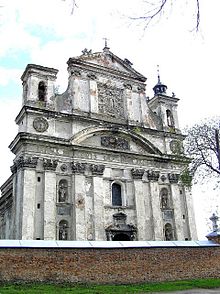- Olyka
-
Coordinates: 50°43′N 25°49′E / 50.717°N 25.817°E
Olyka (Ukrainian: Олика, Polish: Ołyka) is a town in Ukraine in the region of Volhynia. It is located east of Lutsk on the Putilovka river and has approximately 3,800 inhabitants (1992).
Contents
History
The village of Olyka was founded in early Middle Ages as one of the villages belonging to the Kievan Rus'. It was first mentioned in 1149. In 14th century it was conquered by Grand Duchy of Lithuania and in 1569, in the effect of the Union of Lublin became part of Poland.
In the Grand Duchy of Lithuania the village grew rapidly and became a centre of local magnates, initially the family of Kiška and after 1533 - the Radziwills. In second half of the 16th century the town became one of the most important centres of Calvinism in the Polish-Lithuanian Commonwealth. Its growth was halted by the Chmielnicki Uprising of 1648, during which the town was captured by Cossacks, plundered and burnt. However, it was soon rebuilt and in 1654 it received city rights. As the main seat of one of the branches of the influential Radziwill family, Olyka became one of the most important political and trade centres of whole Volhynia.[1][2]
In the Third Partition of Poland (1795) the town was annexed by Russia. In 19th century it continued to play its role as a centre of wood and grain trade. During World War I in 1915 and 1916 the area was a scene of heavy fighting between the forces of Russia and Austria-Hungary. After the Polish-Bolshevik War the town was restored to Poland and the local palace was refurbished. In the effect of the Polish Defensive War of 1939 and the Nazi-Soviet Alliance, the town was occupied by Soviet Union. After the Operation Barbarossa the German occupation started and lasted until 1944. After World War II the area was annexed by the Soviet Union and incorporated into the Ukrainian SSR. Since 1991 it is a part of independent Ukraine.
Notable landmarks
- Olyka Castle - late 16th century, expanded in mid-18th century, damaged after 1945, restored after 1990[3]
- The Calvinist Church, converted in 1580 to a Catholic church of the Holy Trinity, and from 1592 dedicated to Apostles Peter and Paul
- Roman Catholic Collegiate Church of the Holy Trinity (1635–1645)[4]
- The Lutsk Gate of the city (1630s)
- Orthodox Christian Church of the Presentation in the Temple (1784)
- Orthodox Christian Church of the Holy Trinity (1886)
Other Radziwill estates
- Niasvizh Castle
- Mir Castle
Jewish presence
Olyka had a large Jewish community that was all destroyed during the Holocaust, but is still an important place of Jewish memory.[5][6][7] It was believed that the prayer by rabbi David HaLevi Segal miraculously saved the Jewish and non-Jewish citizens of Olyka from the Cossacks' assault of 1651.[8]
Olyka was the cradle of the Olyker Haasidic dynasty that was founded by the famous Rabbi Hersh Leib Landa the first Olyker rebbe. He was followed by his son Rabbi Yoseph Dovid, who was followed by his son Rabbi Mordechai (he authored a book called Gedulas Mordechai), He was followed by his son Rabbi Shimon Shloima (he authored a book called Shekel Hakodesh), he was followed by his son Rabbi Alter Yoseph Dovid who perished together with his whole family during The Holocaust.
A modest monument commemorates the place of execution of more than 4,000 Jews in Summer 1942.
References
- ^ Tadeusz J. Stecki, “Radziwiłłowska Ołyka,” Przegląd Powszechny, vol. 9 (1887)
- ^ Słownik geograficzny Królewstwa Polskiego i innych krajów słowiańskich [Geographical dictionary of Polish Kingdom and other Slavic countries], Bronisław Clebowski and Władysław Walewski eds., vol. 7 (Warsaw, 1888), 527–28.[1]
- ^ http://www.pinakoteka.zascianek.pl/Orda/Images/Olyka.jpg
- ^ http://www.pinakoteka.zascianek.pl/Orda/Images/Olyka_2.jpg
- ^ Pinkas ha-kehila Olyka. Sefer yizkor [Memorial book of community of Olyka], ed. Natan Livne (Tel Aviv, 1972).
- ^ Michael Grinstein, Never Again (Los Angeles, 1973).
- ^ Sergey R. Kravtsov, “A Synagogue in Olyka: Architecture and Legends,” in: Jewish Cultural Studies, vol. 1: Jewishness: Expression, Identity, and Representation, ed. Simon Bronner, (Oxford U.K., 2008), 58–84.
- ^ Menachem-Mendel Biber, Yalkut Menahem (Vilnius, 1903), 5–6.
Administrative divisions of Volyn Oblast, Ukraine Administrative center: Lutsk Raions Horokhiv · Ivanychi · Kamin-Kashyrskyi · Kivertsi · Kovel · Lyubeshiv · Liuboml · Lokachi · Lutsk · Manevychi · Ratne · Rozhysche · Shatsk · Stara Vyzhivka · Turiisk · Volodymyr-Volynskyi

Cities Berestechko · Horokhiv · Kamin-Kashyrskyi · Kivertsi · Kovel · Lutsk · Liuboml · Novovolynsk · Rozhysche · Ustyluh · Volodymyr-VolynskyiUrban-type
settlementsIvanychi · Lokachi · Lyubeshiv · Manevychi · Marianivka · Ratne · Shatsk · Stara Vyzhivka · Turiisk · more...Villages more...Categories:- Galicia (Eastern Europe)
- Towns in Ukraine
- Volyn Oblast
Wikimedia Foundation. 2010.


